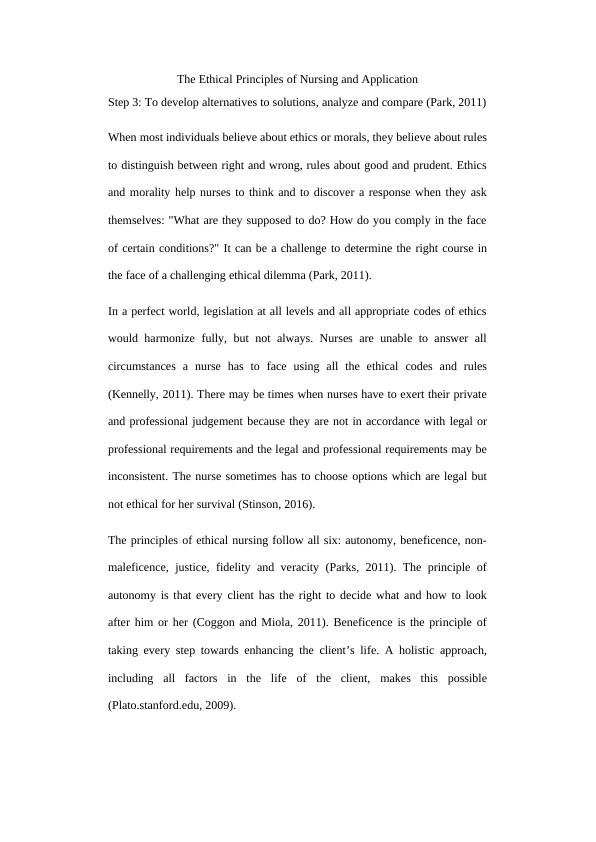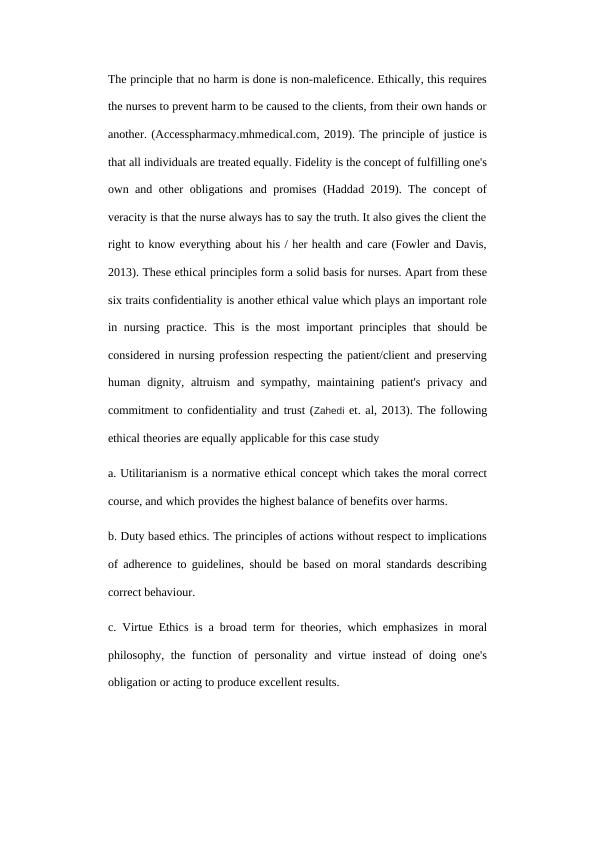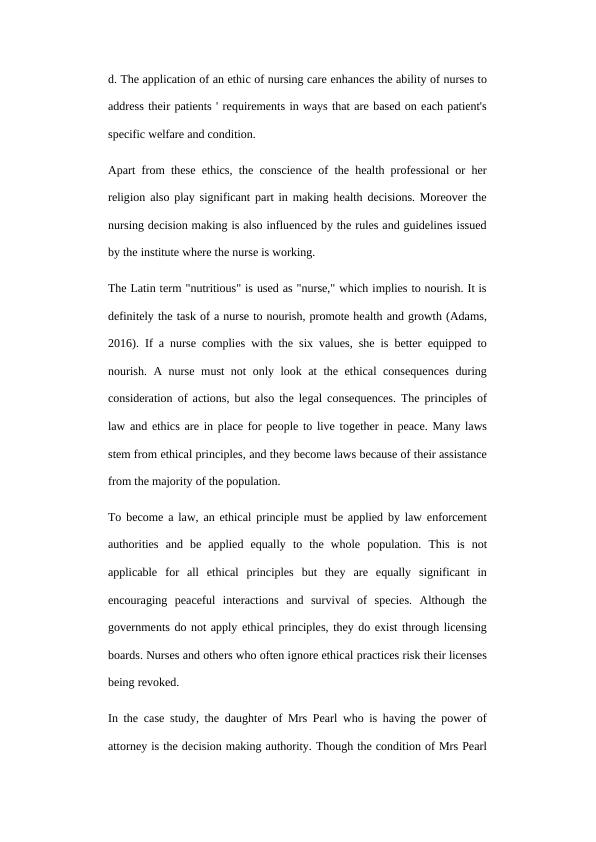Ethical Principles of Nursing and Application | Steps
Added on 2022-09-18
7 Pages2012 Words25 Views
The Ethical Principles of Nursing and Application
Step 3: To develop alternatives to solutions, analyze and compare (Park, 2011)
When most individuals believe about ethics or morals, they believe about rules
to distinguish between right and wrong, rules about good and prudent. Ethics
and morality help nurses to think and to discover a response when they ask
themselves: "What are they supposed to do? How do you comply in the face
of certain conditions?" It can be a challenge to determine the right course in
the face of a challenging ethical dilemma (Park, 2011).
In a perfect world, legislation at all levels and all appropriate codes of ethics
would harmonize fully, but not always. Nurses are unable to answer all
circumstances a nurse has to face using all the ethical codes and rules
(Kennelly, 2011). There may be times when nurses have to exert their private
and professional judgement because they are not in accordance with legal or
professional requirements and the legal and professional requirements may be
inconsistent. The nurse sometimes has to choose options which are legal but
not ethical for her survival (Stinson, 2016).
The principles of ethical nursing follow all six: autonomy, beneficence, non-
maleficence, justice, fidelity and veracity (Parks, 2011). The principle of
autonomy is that every client has the right to decide what and how to look
after him or her (Coggon and Miola, 2011). Beneficence is the principle of
taking every step towards enhancing the client’s life. A holistic approach,
including all factors in the life of the client, makes this possible
(Plato.stanford.edu, 2009).
Step 3: To develop alternatives to solutions, analyze and compare (Park, 2011)
When most individuals believe about ethics or morals, they believe about rules
to distinguish between right and wrong, rules about good and prudent. Ethics
and morality help nurses to think and to discover a response when they ask
themselves: "What are they supposed to do? How do you comply in the face
of certain conditions?" It can be a challenge to determine the right course in
the face of a challenging ethical dilemma (Park, 2011).
In a perfect world, legislation at all levels and all appropriate codes of ethics
would harmonize fully, but not always. Nurses are unable to answer all
circumstances a nurse has to face using all the ethical codes and rules
(Kennelly, 2011). There may be times when nurses have to exert their private
and professional judgement because they are not in accordance with legal or
professional requirements and the legal and professional requirements may be
inconsistent. The nurse sometimes has to choose options which are legal but
not ethical for her survival (Stinson, 2016).
The principles of ethical nursing follow all six: autonomy, beneficence, non-
maleficence, justice, fidelity and veracity (Parks, 2011). The principle of
autonomy is that every client has the right to decide what and how to look
after him or her (Coggon and Miola, 2011). Beneficence is the principle of
taking every step towards enhancing the client’s life. A holistic approach,
including all factors in the life of the client, makes this possible
(Plato.stanford.edu, 2009).

The principle that no harm is done is non-maleficence. Ethically, this requires
the nurses to prevent harm to be caused to the clients, from their own hands or
another. (Accesspharmacy.mhmedical.com, 2019). The principle of justice is
that all individuals are treated equally. Fidelity is the concept of fulfilling one's
own and other obligations and promises (Haddad 2019). The concept of
veracity is that the nurse always has to say the truth. It also gives the client the
right to know everything about his / her health and care (Fowler and Davis,
2013). These ethical principles form a solid basis for nurses. Apart from these
six traits confidentiality is another ethical value which plays an important role
in nursing practice. This is the most important principles that should be
considered in nursing profession respecting the patient/client and preserving
human dignity, altruism and sympathy, maintaining patient's privacy and
commitment to confidentiality and trust (Zahedi et. al, 2013). The following
ethical theories are equally applicable for this case study
a. Utilitarianism is a normative ethical concept which takes the moral correct
course, and which provides the highest balance of benefits over harms.
b. Duty based ethics. The principles of actions without respect to implications
of adherence to guidelines, should be based on moral standards describing
correct behaviour.
c. Virtue Ethics is a broad term for theories, which emphasizes in moral
philosophy, the function of personality and virtue instead of doing one's
obligation or acting to produce excellent results.
the nurses to prevent harm to be caused to the clients, from their own hands or
another. (Accesspharmacy.mhmedical.com, 2019). The principle of justice is
that all individuals are treated equally. Fidelity is the concept of fulfilling one's
own and other obligations and promises (Haddad 2019). The concept of
veracity is that the nurse always has to say the truth. It also gives the client the
right to know everything about his / her health and care (Fowler and Davis,
2013). These ethical principles form a solid basis for nurses. Apart from these
six traits confidentiality is another ethical value which plays an important role
in nursing practice. This is the most important principles that should be
considered in nursing profession respecting the patient/client and preserving
human dignity, altruism and sympathy, maintaining patient's privacy and
commitment to confidentiality and trust (Zahedi et. al, 2013). The following
ethical theories are equally applicable for this case study
a. Utilitarianism is a normative ethical concept which takes the moral correct
course, and which provides the highest balance of benefits over harms.
b. Duty based ethics. The principles of actions without respect to implications
of adherence to guidelines, should be based on moral standards describing
correct behaviour.
c. Virtue Ethics is a broad term for theories, which emphasizes in moral
philosophy, the function of personality and virtue instead of doing one's
obligation or acting to produce excellent results.

d. The application of an ethic of nursing care enhances the ability of nurses to
address their patients ' requirements in ways that are based on each patient's
specific welfare and condition.
Apart from these ethics, the conscience of the health professional or her
religion also play significant part in making health decisions. Moreover the
nursing decision making is also influenced by the rules and guidelines issued
by the institute where the nurse is working.
The Latin term "nutritious" is used as "nurse," which implies to nourish. It is
definitely the task of a nurse to nourish, promote health and growth (Adams,
2016). If a nurse complies with the six values, she is better equipped to
nourish. A nurse must not only look at the ethical consequences during
consideration of actions, but also the legal consequences. The principles of
law and ethics are in place for people to live together in peace. Many laws
stem from ethical principles, and they become laws because of their assistance
from the majority of the population.
To become a law, an ethical principle must be applied by law enforcement
authorities and be applied equally to the whole population. This is not
applicable for all ethical principles but they are equally significant in
encouraging peaceful interactions and survival of species. Although the
governments do not apply ethical principles, they do exist through licensing
boards. Nurses and others who often ignore ethical practices risk their licenses
being revoked.
In the case study, the daughter of Mrs Pearl who is having the power of
attorney is the decision making authority. Though the condition of Mrs Pearl
address their patients ' requirements in ways that are based on each patient's
specific welfare and condition.
Apart from these ethics, the conscience of the health professional or her
religion also play significant part in making health decisions. Moreover the
nursing decision making is also influenced by the rules and guidelines issued
by the institute where the nurse is working.
The Latin term "nutritious" is used as "nurse," which implies to nourish. It is
definitely the task of a nurse to nourish, promote health and growth (Adams,
2016). If a nurse complies with the six values, she is better equipped to
nourish. A nurse must not only look at the ethical consequences during
consideration of actions, but also the legal consequences. The principles of
law and ethics are in place for people to live together in peace. Many laws
stem from ethical principles, and they become laws because of their assistance
from the majority of the population.
To become a law, an ethical principle must be applied by law enforcement
authorities and be applied equally to the whole population. This is not
applicable for all ethical principles but they are equally significant in
encouraging peaceful interactions and survival of species. Although the
governments do not apply ethical principles, they do exist through licensing
boards. Nurses and others who often ignore ethical practices risk their licenses
being revoked.
In the case study, the daughter of Mrs Pearl who is having the power of
attorney is the decision making authority. Though the condition of Mrs Pearl

End of preview
Want to access all the pages? Upload your documents or become a member.
Related Documents
Ethical Issues in Health Care Practice - Deskliblg...
|18
|4596
|347
Issues in Health and Sociallg...
|7
|1130
|33
Ethical and Legal Considerations in Nursing: A Case Studylg...
|7
|2256
|155
Ethical Issues in Adolescent Pregnancy: A Case Studylg...
|7
|2364
|412
Ethical Dilemma in Nursinglg...
|11
|2626
|296
Legal and Ethical Considerations in a Case Studylg...
|8
|2938
|87
